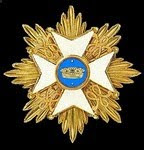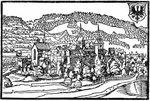First raised 1740 for Frederick's younger brother Ferdinand who commanded it throughout the Seven Years War.
In 1756 IR34 was part of the King's army that surrounded the Saxons at Pirna. In January 1757 it was one of 38 regiments whose companies were strengthened by 30 men each. From May 2nd the regiment and its grenadiers were stationed on the west side of Prague as part of that city's encirclement by the Prussians, and was not present at the battles of Prague and Kolin.The grenadiers suffered heavy casualties at the battle of Moys where Winterfeld was killed on September 7th and then fought in the defeat at Breslau on 22nd November. There General von Schulze was killed and Prince Ferdinand grabbed a flag and led the regiment in a fierce, if unavailing, counterattack. Under Zieten it was with the army at Leuthen, where its single remaining battalion fought on the left wing of the second line.
In 1758 it was at the failed siege of Olmütz and then on June 30th helped defend the wagon train at Domstadtl, managing to save some of the wagons from the Austrian attack. From August that year it was with the Margrave Karl and then joined the King in Dresden on September 11th. At Hochkirch with Retzow's Corps it helped cover the army's retreat.
In 1759 the regiment was encamped at Schmottseiffen but was not at Kunersdorf.
In 1760 the grenadiers fought a bitter last stand at Landeshut with Fouqué on June 23rd; the survivors were made prisoner. At Liegnitz on August 15th the regiment was part of the counterattack made with the formerly disgraced regiment Anhalt-Bernburg, which redeemed itself by defeating the main Austrian attack with heavy losses. (IR34 suffered at least 60% casualties - Duffy, Army of Frederick the Great 1st Edition.) The remnants of the regiment then went to Breslau. Frederick praised the regiment's courage in a proclamation and awarded five Pour-le-merite medals, plus a hundred gold pieces to each captain.
In late October 1761 the regiment went to Pomerania where it took part in "the luckless campaign" to the end of the year.
The regiment gave distinguished service at the siege of Schweidnitz from August 8th to October 8th where a captain and two lieutenants were awarded the Pour-le-merite. At the end of the war in 1763 the composition of the regiment was: 1230 native Prussians, 127 Saxons and 566 foreigners.
And this was the uniform in 1756:



















